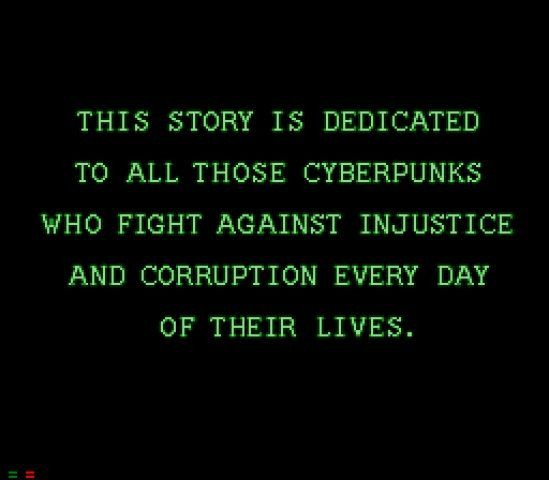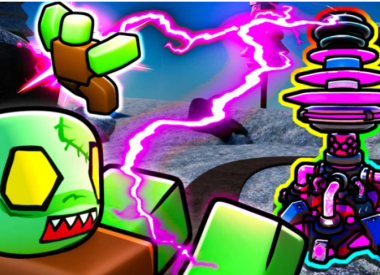The Last Night ’s Steam page describes their putative cyberpunk game as follows:
“Humans first knew the era of survival. Then they knew the era of work. Now they live in the era of leisure. Machines have surpassed human labour not only in strength, but in precision, intellect, and creativity. Stabilised by universal income, people struggle to find their calling or identity, and define themselves by what they consume, rather than what they create.”
Let’s pretend that’s true. Let’s pretend that with the basics of survival taken care of, no human uses the mental energy thus freed to create art, literature, music, film. Let’s accept the premise that no human, freed from the daily drain of grinding themselves to dirt doing menial work to survive, finds their passion. Stable people who don’t need to worry about money, like wealthy patrons of society in any age, just fart about playing video games and wearing branded t-shirts.
This is the dystopia: this is the setting. It’s weak and unimaginative, especially because crises of calling and identity already exist in late capitalism today without the terrible prospect of having one’s basic needs provided for, but there is a germ of an idea present. (Let’s not get into how automation is already present today in late capitalism; let’s not examine its effect on those industries and their former workers who have already been displaced, who have no despicable, ruinous recourse such as universal income. Let’s just take the premise as it is and move on.)
(Wait: Let’s not talk about how a world where basic needs are met is not a dystopia and certainly not a cyberpunk dystopia, which rests on massive inequality. Now, if your access to universal income hinges on your usefulness and obedience to the corporate overlords who never let you forget what they provide for you, reinforced by constant, inescapable surveillance…)
(Let’s not even talk about how there’s not a creative alive who doesn’t feel surpassed in creativity by their toaster.)
However, there’s much more beneath the surface, as revealed by a dig into Tim Soret’s Internet history. Soret, founder of The Last Night developer Odd Tales, has a long history of reactionary GamerGate politics with all the anti-feminist bells and whistles you could expect. The game, Soret has made clear, is about “progressivism” gone mad. He has even been kind enough to tell us what that means to him, exactly:



And he has assured us that his game is true to his “original vision”:
The Last Night is 100% safe now: it's going to completion with our original vision fully intact, supported by some of the nicest people.
— Tim Soret (@timsoret) February 23, 2017
In a lengthy statement, publisher Raw Fury Games pointed to the age of Soret’s comments and indicated that the dev was no longer a serious GamerGater. “The wording of his statements toward feminism in 2014 was poor, and his buying into GamerGate as a movement on the notion that it represented gamers against journalists was naive… We trust Tim and know that he is an advocate for progression both in and outside of our industry, and we hope that this will be apparent moving forward.”
Soret addressed the issue on stage at the PC Gaming Show as well. “I want to apologize for those [tweets],” he said. “They don’t in any way represent where I am today or what The Last Night will be about.”
Of course people grow and change. Of course those tweets are three years old, and of course Soret is still a young man, not even 30 years old yet. There are other excuses and many folks eager to make them for him. On Twitter Soret posted a series of tweets to clarify his stance:
Controversy time. That's fine. Let's talk about it, because it's important.
— Tim Soret (@timsoret) June 12, 2017
1 - I completely stand for equality & inclusiveness.
2 - In no way is The Last Night a game against feminism or any form of equality. A lot of things changed for me these last years.
— Tim Soret (@timsoret) June 12, 2017
3 - The fictional setting of the game does challenge techno-social progress as a whole but certainly not trying to promote regressive ideas.
— Tim Soret (@timsoret) June 12, 2017
But his apology seems small and his disavowal weak, and most importantly, apology aside, the game has been in development for all the years Soret has been running his mouth off and tweeting #notyourshield. Money and partnerships are on the line, and he apologized; that’s great for him, his money and his partnerships. But an apology does not address the aesthetically and ideologically bankrupt foundation of his game, which is, he has assured us, safe.
My problem with The Last Night is not with Soret’s loathsome politics, past or present. My problem is that those politics are packaged up in a cyberpunk aesthetic to which they have no right. There is no separating the art from the artist in this case or in any case. There is no such thing as a “neutral” creative decision. Creative work is not plucked into existence from the forehead of Zeus – every choice is political because each person brings their biases, prejudices and political leanings to their work. This is inescapable, and even active efforts of unlearning can go astray when faced with a lifetime of indoctrination.
Soret’s politics are therefore, as he’s promised, well set in his game. But cyberpunk isn’t just about neon and chrome, slick metal surfaces, holographic ads and skyscrapers, androids and denim jackets. That’s the genre’s window dressing, and it’s all in service of a point: the tension between the corporate and the individual, the powerful and the powerless, those who rule society and those on its fringes, those who silence dissent and those who rebel. Cyberpunk is a dystopian future where authoritarianism and corporatism has run amok and gone unhinged.
That’s not to say that stories that explore the world of power and privilege aren’t worth telling or cannot be told in a way true to the cyberpunk ethos. But you can’t lose your moral compass when you tell those stories. You can’t ever forget the victims, the oppressed and the forgotten as you tell your story about those with power. Otherwise, you lose the right to call your story “cyberpunk” no matter how much neon you slap onto your pixels.
On Steam, the devs make the astonishingly ignorant assertion that their game is "post-cyberpunk" as though this is a genre they have created, not one that has existed since 1988. But this term doesn't apply either, as both genres have significant overlap that rests on their portrayal of technology, social ills and their causes, a fundamental base which the dev's comments give us no reason to think has been established, since the root cause of this "dystopia" and protagonist Charlie's plight is the existential malaise engendered by universal income in a technologically advanced world. (Poor Charlie, living in this "gamified world" so very far from our own. Wonder how much money he's invested in Candy Crush?) For alternate genre names, might I suggest “cyberpop”? “Cyberreactive”? “Cyberregressive”? “ Diaperpunk ”?
To delve deeper into one representative point: how can a man who thinks that artificial uteri represent feminism gone mad instead of a revolutionary device that allows women to participate in civic life as never before possibly have anything but the most shallow and cynical take on eugenics? What kind of malicious, dismissive take is it that an artificial uterus nightmarishly enables women to work, drink and smoke (to participate in life as men do)? What kind of ignorance and arrogance is it to think that women have not already explored, with greater depth, nuance and empathy, the idea of an artificial uterus (Lois McMaster Bujold has been writing about worlds transformed by this technology since before Tim Soret was born)?
Cyberpunk is not just an aesthetic. It is a political genre with a history. If you lose the politics of rebellion against corporations so vast they are inhuman, if you lose track of the costs paid by the powerless, if you ignore questions of bodily autonomy and human identity in worlds with chop shops and body mods, if you never question what choices someone born into those oh-so-aesthetic slums might have and who defines those choices, if you ignore the reckless destruction of people, the planet, free speech and free will in the service of the moneyed 1%, then what are you doing playing at cyberpunk?
And yet The Last Night , cloaked in all of cyberpunk’s aesthetic and missing its beating heart, does indeed look beautiful. Its moody, neon pixels glow entrancingly. But if Soret’s politics have wormed their way into every crevice of this seductively pretty world, then the world lacks the grit and soul that makes cyberpunk successful. What a shame.

At the end of the day, as cyberpunk adventure game Snatcher tells us, cyberpunk lionizes “all those cyberpunks who fight against injustice and corruption every day of their lives.” Cyberpunk is not for or about armchair warriors who consider calling women cunts online their raison d’etre, and it is not about comforting those who quaver in fear of progressivism gone mad. A cyberpunk world that is afraid of itself? What a ridiculous notion.
The whole internet loves Milkshake Duck, a lovely duck that drinks milkshakes! *5 seconds later* We regret to inform you the duck is racist
— pixelatedboat aka “mr tweets” (@pixelatedboat) June 12, 2016
Thank you to GamerGate guy for celebrating this tweet's first birthday in style
— pixelatedboat aka “mr tweets” (@pixelatedboat) June 12, 2017


















